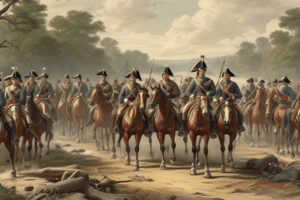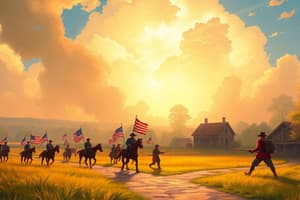Podcast
Questions and Answers
True or false: The Battles of Lexington and Concord were the first military engagements of the American Revolutionary War.
True or false: The Battles of Lexington and Concord were the first military engagements of the American Revolutionary War.
True (A)
True or false: The British forces were given orders to protect Colonial military supplies at Concord.
True or false: The British forces were given orders to protect Colonial military supplies at Concord.
False (B)
True or false: Patriot leaders had received word weeks before the expedition that their supplies might be at risk and had moved most of them to other locations.
True or false: Patriot leaders had received word weeks before the expedition that their supplies might be at risk and had moved most of them to other locations.
True (A)
True or false: Paul Revere and Samuel Prescott warned militias in the area by several riders about British plans.
True or false: Paul Revere and Samuel Prescott warned militias in the area by several riders about British plans.
True or false: The British suffered only one casualty in the battles of Lexington and Concord.
True or false: The British suffered only one casualty in the battles of Lexington and Concord.
True or false: The colonists were not aware that April 19 would be the date of the expedition.
True or false: The colonists were not aware that April 19 would be the date of the expedition.
True or false: General Thomas Gage was the military governor of Massachusetts and commander of the British military forces in Boston.
True or false: General Thomas Gage was the military governor of Massachusetts and commander of the British military forces in Boston.
True or false: Gage's plan was to remove military supplies from Whig militias using small, secret, and rapid strikes.
True or false: Gage's plan was to remove military supplies from Whig militias using small, secret, and rapid strikes.
True or false: The engagement at Lexington resulted in the death of 1 British soldier.
True or false: The engagement at Lexington resulted in the death of 1 British soldier.
True or false: The battle demonstrated the American colonists' willingness to fight for their independence from French rule.
True or false: The battle demonstrated the American colonists' willingness to fight for their independence from French rule.
Flashcards are hidden until you start studying
Study Notes
- The Battles of Lexington and Concord were the first military engagements of the American Revolutionary War.
- The British forces were given secret orders to capture and destroy Colonial military supplies at Concord.
- Patriot leaders had received word weeks before the expedition that their supplies might be at risk and had moved most of them to other locations.
- Paul Revere and Samuel Prescott warned militias in the area by several riders about British plans.
- The first shots were fired in Lexington, and eight militiamen were killed.
- The British suffered only one casualty.
- The accumulated militias then blockaded the narrow land accesses to Charlestown and Boston, starting the siege of Boston.
- The colonists were also aware that April 19 would be the date of the expedition.
- General Gage called a meeting of his senior officers at the Province House and informed them that instructions from Lord Dartmouth had arrived, ordering him to take action against the colonials.
- Lieutenant Colonel Francis Smith received orders from Gage on the afternoon of April 18 with instructions that he was not to read them until his troops were underway.- The colonists formed militias for defense against Indian attacks and fought alongside British regulars in the French and Indian War.
- General Thomas Gage was the military governor of Massachusetts and commander of the British military forces in Boston.
- Gage's plan was to remove military supplies from Whig militias using small, secret, and rapid strikes.
- The engagement at Lexington was a minor skirmish that resulted in the death of 8 colonists and 1 British soldier.
- The first shot fired at Lexington is uncertain, with some witnesses claiming it came from a colonial onlooker and others claiming it came from the British.
- The militia retreated to Concord, where they were joined by more Minutemen and militia from Acton, Concord, Bedford, and Lincoln.
- The British troops searched for military supplies in Concord but found little of consequence.
- The militiamen occupied a hill overlooking the North Bridge and advanced when ordered to do so by Colonel Barrett.
- The British companies guarding the bridge retreated across it, and the colonists did not fire until fired upon.
- The engagement at North Bridge resulted in the deaths of 2 colonists and several British soldiers.On April 19, 1775, a detachment of British troops marched from Boston to Concord to seize military supplies stored by the colonists. At Lexington, they encountered a group of Minutemen and a shot was fired, leading to the first battle of the American Revolution. At Concord, the British searched for military supplies and faced resistance from the colonists at the North Bridge. A skirmish ensued, resulting in casualties on both sides. The British retreated back to Boston, facing ambushes and attacks from the colonists along the way. Earl Percy's brigade arrived to reinforce the British, allowing them to make it back to Boston safely. The battle demonstrated the American colonists' willingness to fight for their independence from British rule.- Percy left Boston without spare ammunition, assuming extra wagons would slow him down
- A small party of veteran militiamen ambushed and demanded the surrender of the ammunition wagons, killing two sergeants and wounding an officer
- Heath arrived and took command of the militia, ordering them to avoid close formations and surround Percy's marching square with a moving ring of skirmishers
- The fighting grew more intense as Percy's forces crossed from Lexington into Menotomy, with fresh militia pouring gunfire from a distance and individual homeowners fighting from their own property
- Percy lost control of his men, and many committed atrocities to repay for the supposed scalping at the North Bridge and for their own casualties
- The British troops crossed the Menotomy River into Cambridge, and the fight grew more intense, with fresh militia arriving in close array
- Percy directed his troops down a narrow track and onto the road to Charlestown, breaking the circle of fire
- A large militia force arrived from Salem and Marblehead, but these men halted on nearby Winter Hill and allowed the British to escape
- Pitcairn's Marines defended a final attack on Percy's rear as they entered Charlestown
- The regulars took up strong positions on the hills of Charlestown, holding high ground protected by heavy guns from HMS Somerset.
Studying That Suits You
Use AI to generate personalized quizzes and flashcards to suit your learning preferences.




